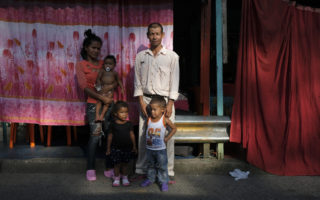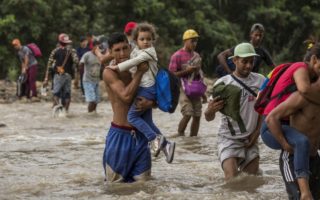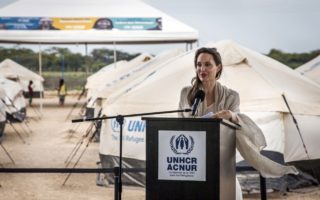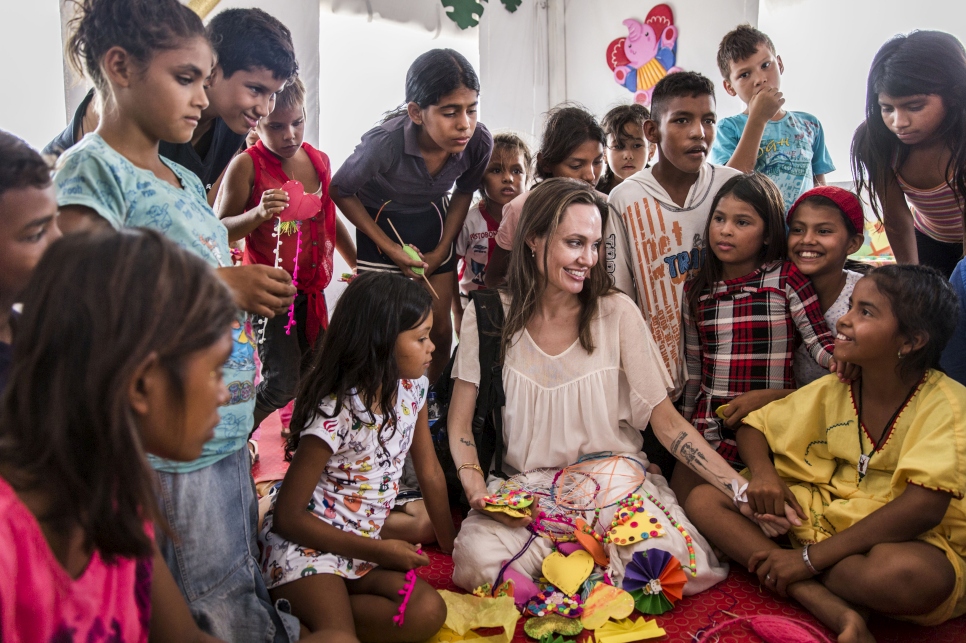
UNHCR Special Envoy Angelina Jolie meets with children who fled Venezuela at the Integrated Assistance Centre, in Maicao, Colombia. © UNHCR/Andrew McConnell
On a two-day visit to Colombia, the UNHCR Special Envoy met with refugees, returnees and government officials to assess the human impact of a mounting exodus.
By Christopher Reardon
MAICAO, Colombia – With over 4 million Venezuelans now living in exile, UNHCR Special Envoy Angelina Jolie today appealed for more leadership, more humanity and more support to countries bearing the brunt of the crisis.
“This is a life and death situation for millions of Venezuelans,” Jolie told journalists at a press conference here this afternoon. “It is not possible to put a value on the support that Colombia and Peru and Ecuador are giving to the people of Venezuela, because it is the core of what it is to be human.”
In the world today, she added, “we need that humanity more than ever, and rational thinking from people who are unafraid to take responsibility and show leadership.”
“This is a life and death situation for millions of Venezuelans.”
Jolie’s stop in Maicao capped a two-day trip to Colombia, a country she has longed to visit since 2002, when she met refugees in neighbouring Ecuador who had fled decades of conflict in Colombia. She returned to Ecuador in 2010, and again in 2012, to meet with Colombian refugees. This was her 65th mission overall with UNHCR, the UN Refugee Agency, since 2001. She was joined by the agency’s Deputy High Commissioner, Kelly Clements, who had just spent three days with Venezuelan refugees in Ecuador.
Jolie spoke to journalists less than ten kilometres from the border, at a centre that is hosting Venezuelans for stays of up to 30 days. Known as the Integrated Assistance Centre, it currently provides 350 highly vulnerable people with shelter and food as well as legal assistance, activities for children, medical assessments and psychosocial support.
The centre was opened in March by UNHCR and the Colombian government, but plans to expand its capacity to 1,400 people have stalled due to a 79 per cent funding shortfall that has slowed the humanitarian response throughout the entire region, putting millions at risk.
“Your children will think back on this time as the time that you really saved them.”
At the centre, Jolie met one young family who crossed the border in April. Maria, a 41-year-old single mother with six children, spoke of how she sold the metal roof over her family’s heads back in Venezuela and spent the money to clothe her children and put shoes on their feet for the journey to Colombia.
“Your children will think back on this time as the time that you really saved them,” Jolie told her.
Earlier in the day the Special Envoy met with Colombian President Iván Duque in Cartagena. She expressed her gratitude to the government and people of Colombia for responding to the Venezuela crisis with what she called “truly remarkable generosity” – particularly as it works to implement a peace plan following five decades of bloodshed within its borders.
Jolie started her visit on Friday at a shelter in Riohacha for Colombian and Venezuelan youth who have been sexually abused or trafficked, a danger facing many young people on the move in this border region, one of the poorest in Colombia.
“They’re protecting us here,” said one 17-year-old Colombian girl at the shelter, which opened earlier this year with support from UNHCR and its partners. “They’re helping us, taking care of us. I feel respected here and proud.”
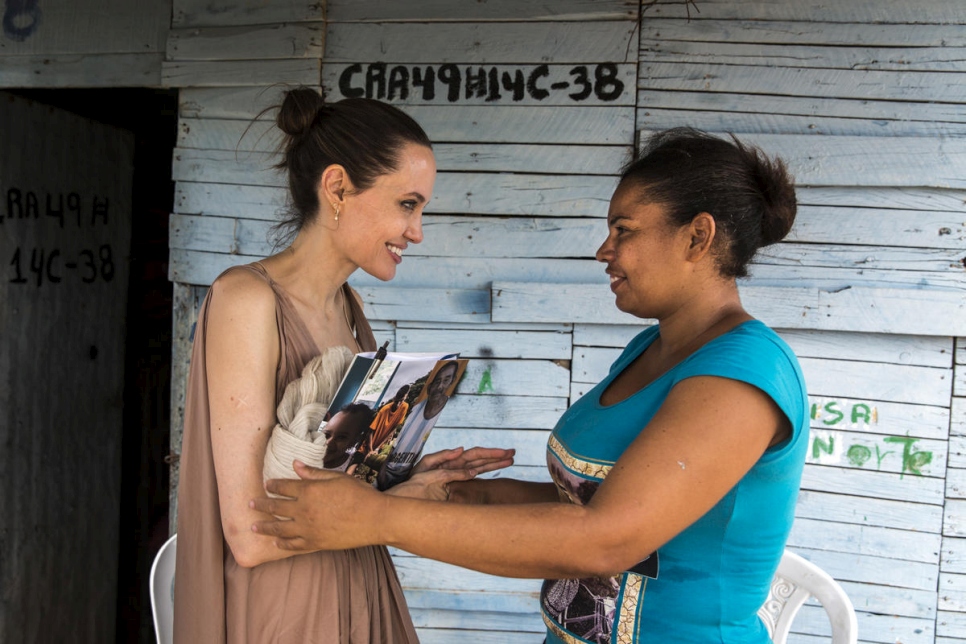
UNHCR Special Envoy Angelina Jolie speaks with Yoryanis Ojeda, 35, a former Colombian refugee who returned from Venezuela and is living in an informal settlement in Riohacha, Colombia. © UNHCR/Andrew McConnell
The Special Envoy also visited Brisas del Norte, an informal settlement that is home to hundreds of Colombian and Venezuelan families. The Colombians are former refugees who returned to their country to escape the political and economic crisis in Venezuela, the same conditions that forced the Venezuelans to seek refuge here.
Linda Lopez, a 60-year-old Venezuelan woman who arrived one month ago, approached Jolie as she walked through the community and described the dangers she faced back home. “People are dying of hunger,” Lopez said, breaking into tears. “My whole family fled.”
“People are dying of hunger. My whole family fled.”
Perched on a sandy bluff on the Caribbean coast, the settlement is blessed with an idyllic location, but conditions are rough. Residents live in simple homes built from recycled wood and corrugated zinc sheeting.
Rocio, who was born in Colombia but lived in Venezuela for decades, told Jolie of the struggles she fled. “It was impossible to find medication, food, education,” she said. “The last time I stood in line for food I waited 18 hours.”
A neighbour, Yoryanis Ojeda, 35, spoke of similar pressures that drove her to leave. “When you get to the point where you can’t feed your children anymore, you know you can’t go on.”
Originally published by UNHCR on 8 June 2019



